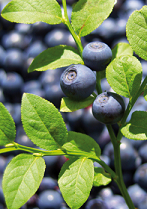- Bilberry is a plant. The dried, ripe fruit and leaves are used to make medicine.
Contents
Uses
- Bilberry is used for improving eyesight, including night vision. Bilberry is also used for treating eye conditions such as cataracts and disorders of the retina. There is some evidence that bilberry may help retinal disorders.
- Some people use bilberry for conditions of the heart and blood vessels including hardening of the arteries (atherosclerosis), varicose veins, decreased blood flow in the veins, and chest pain.
- Bilberry is also used for chronic fatigue syndrome (CFS), hemorrhoids, diabetes, osteoarthritis, gout, skin infections, gastrointestinal (GI) disorders, kidney disease, and urinary tract infections (UTIs).
- It is sometimes applied directly to the inside of the mouth for mild mouth and throat soreness.
Benefits
- Bilberry contains chemicals called tannins that can help improve diarrhea, as well as mouth and throat irritation, by reducing swelling. There is some evidence that the chemicals found in bilberry leaves can help lower blood sugar and cholesterol levels. Some researchers think that chemicals called flavonoids in bilberry leaf might also improve circulation in people with diabetes. Circulation problems can harm the retina of the eye.
- Circulation problems (chronic venous insufficiency). Early research suggests that taking bilberry extract that contains 173 mg of certain chemicals, called anthocyanins, daily for 30 days reduces symptoms associated with a circulation problem called chronic venous insufficiency (CVI). Other research suggests that taking 100-480 mg of bilberry anthocyanins daily for up to 6 months might improve swelling, pain, bruising, and burning associated with CVI.
- Problems with the retina of the eye in people with diabetes or high blood pressure (retinopathy). Eating bilberry fruit containing a high amount of a certain chemical, called anthocyanoside, seems to improve retina problems associated with diabetes or high blood pressure.
Side Effects
- The dried, ripe fruit of bilberry is LIKELY SAFE for most people when eaten in typical food amounts.
- Bilberry fruit extracts are POSSIBLY SAFE when taken by mouth for medicinal uses for up to one year. Also, a specific combination product (Mirtogenol) containing bilberry and French maritime pine bark (Pycnogenol) has been used safely for up to 6 months.
- Bilberry leaf is POSSIBLY UNSAFE for most people when taken in high doses or for a long time.
- Pregnancy or breast-feeding: Not enough is known about the use of bilberry during pregnancy and breast-feeding. Stay on the safe side and avoid use.
- Diabetes: Bilberry leaf might lower blood sugar. Taking bilberry leaves along with diabetes medications might cause your blood sugar to go too low. Monitor your blood sugar closely.
- Surgery: Bilberry might affect blood glucose levels. This could interfere with blood sugar control during and after surgery. Stop taking bilberry at least two weeks before a scheduled surgery.
Interactions
Moderate Interaction – Be cautious with this combination
- Medications for diabetes (Antidiabetes drugs) interacts with BILBERRY: Bilberry leaves might decrease blood sugar. Diabetes medications are also used to lower blood sugar. Taking bilberry leaves along with diabetes medications might cause your blood sugar to go too low. Monitor your blood sugar closely. The dose of your diabetes medication might need to be changed.
- Some medications used for diabetes include glimepiride (Amaryl), glyburide (DiaBeta, Glynase PresTab, Micronase), insulin, pioglitazone (Actos), rosiglitazone (Avandia), chlorpropamide (Diabinese), glipizide (Glucotrol), tolbutamide (Orinase), and others.
- Medications that slow blood clotting (Anticoagulant / Antiplatelet drugs) interacts with BILBERRY: There is some concern that bilberry might slow blood clotting. Taking bilberry along with medications that also slow clotting might increase the chances of bruising and bleeding. However, there is not enough information to know if this is a serious concern.
- Some medications that slow blood clotting include aspirin, clopidogrel (Plavix), diclofenac (Voltaren, Cataflam, others), ibuprofen (Advil, Motrin, others), naproxen (Anaprox, Naprosyn, others), dalteparin (Fragmin), enoxaparin (Lovenox), heparin, warfarin (Coumadin), and others.
References
Source: WEBMD, web article (user reviewed), www.webmd.com

